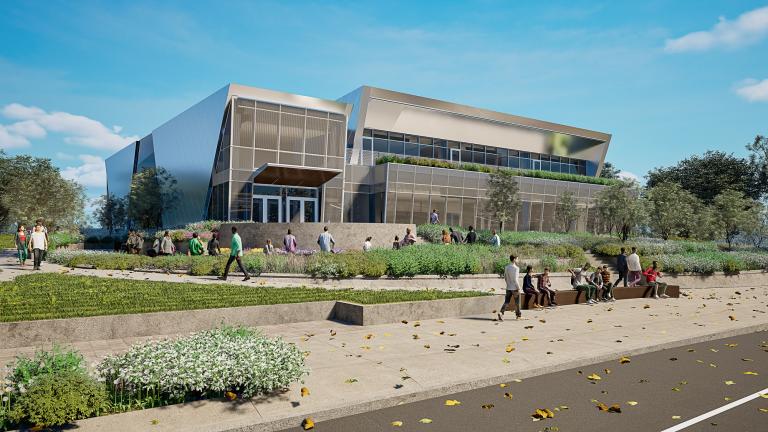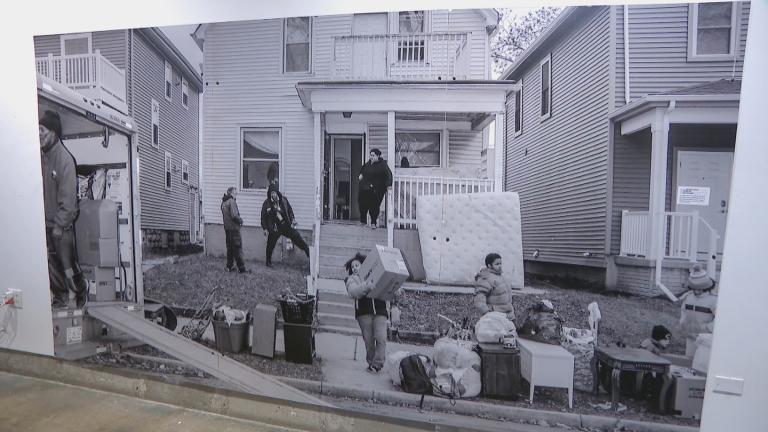 A residential street in Wicker Park in Chicago. (WTTW News)
A residential street in Wicker Park in Chicago. (WTTW News)
Illinois’ ban on evictions caused by the COVID-19 pandemic is set to end Sunday after more than 18 months. Millions of dollars in rental assistance have yet to make it to tenants at risk of losing their homes.
Gov. J.B. Pritzker declared a moratorium on evictions beginning in March 2020 as part of the state’s stay-at-home order designed to stop the spread of the coronavirus. Originally, the ban was set to expire at the end of August, but the governor extended the moratorium as cases of COVID-19 surged, driven by the delta variant of the virus and lagging vaccinations.
State, city and county officials urged residents at risk of eviction to apply for rental assistance and explore their legal options to prevent an eviction.
Housing advocates have warned that the end of the moratorium could trigger a tsunami of evictions that will trigger a surge in COVID-19 cases and destabilize families already struggling during the pandemic.
Approximately 21,000 households in Chicago could be evicted from their rental homes once the ban is lifted, according to a forecast released in December by the Lawyers’ Committee for Better Housing and the Center for Urban Research & Learning at Loyola University.
A survey by the Neighborhood Building Owners Alliance found that Chicago housing providers have not been paid $1 billion in rent since March 2020.
A Chicago law will require landlords seeking to evict tenants who can’t pay rent because of the financial impact of the pandemic to show proof that they tried to work out an agreement during the two months after the state’s ban is lifted, officials said. That could include applying for financial assistance from state and city programs.
Chicago residents can check the status of an application for rental assistance submitted in the summer at chicago.gov/renthelp, while those who need legal assistance can call 312-347-7600 or go to rentervention.com to reach free services offered by the Lawyers’ Committee for Better Housing.
Approximately 26,850 Chicagoans applied in May and June for $137 million in grants designed to stave off a wave of evictions and keep the lights on across Chicago, according to city officials.
However, city officials had only $80 million available in this round of assistance.
The Chicago Department of Housing officials have sent more than $38 million to nearly 5,000 households as of Sept. 27, officials said.
State officials have sent $443 million in emergency rental assistance to 49,100 households through the Illinois Rental Payment Program, 90% of the funds the state has available. Each household got an average of $9,021 per household, officials said.
That makes Illinois a leader in helping residents avoid evictions caused by the pandemic, Pritzker said in a statement.
“Having a roof over your head is the foundation of a thriving life, and Illinois is fiercely combatting the pandemic’s destabilizing effects on that foundation by keeping our residents on their feet,” Pritzker said.
Additional rounds of assistance for both rent and mortgage payments will be announced later this fall by Illinois and Chicago officials using federal relief funds from the American Rescue Plan Act.
Cook County Board President Toni Preckwinkle announced Friday that the county will use $75 million from its share of the American Rescue Plan to send rental assistance to residents of suburban Cook County.
Applications will open Monday and close Oct. 29 for up to 18 months of rental assistance, county officials said.
Cook County residents served with an eviction notice can go to cookcountylegalaid.org or call 855-956-5763 to get free legal aid and mediation services.
Contact Heather Cherone: @HeatherCherone | (773) 569-1863 | [email protected]








